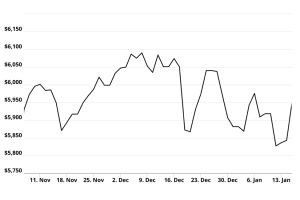
This has been a particularly interesting year for the stock market, with various indices experiencing significant gains, and others not moving much at all. For all the hype around the “new bull market,” a rising tide has not lifted all boats. Given historical trends, it is not entirely impossible to think that the peak for the year already happened in July for the S&P 500.
It’s still possible that the peak for the year happened in July.
This is a historical look at stocks in terms of the percentage of times in a particular month the year’s peak happened in that month.
The majority of times, markets make new highs into year-end.
Not always. pic.twitter.com/vwlqJmz24H
— Michael A. Gayed, CFA (@leadlagreport) September 1, 2023
Let’s look into why we may now be entering a much more difficult period in the short to intermediate term. This pending movement could justify a July stock market peak.
The Evidence
First of all, consider that buoyant market performance is, to some extent, incongruous with deteriorating economic data. The Institute for Supply Management’s manufacturing indices, potent indicators of overall economic direction, have been on a downward trajectory for 18 months. For eight of those months, they were sitting in contraction territory.
I don’t know fam – falling ISM Manufacturing PMI typically happens with recessions. pic.twitter.com/6VN4T6L46a
— Michael A. Gayed, CFA (@leadlagreport) September 1, 2023
Corporate earnings also have significant implications for stock market trends. The first and second quarters of 2023 saw company profits contract from previous quarters. However, this slowdown was not as severe as many expected.
If investor confidence in earnings improves, it could provide a boost to the market. The reality behind this, though, is that such outperformance has been selective. This likely also explains why small-cap stocks have lagged so badly this year. The reality is breadth has only worsened instead.
The percentage of stocks in the NASDAQ currently trading above their respective 200 day moving averages plummeted last month, and now sits at 36.39%.
Breadth has only worsened, and never took out the year’s peak.
New bull market?
You sure? pic.twitter.com/v1FGJRajAR
— Michael A. Gayed, CFA (@leadlagreport) September 1, 2023
Consumer spending is another crucial aspect influencing market trends. Consumers have demonstrated resilience, likely due to the strength of the labor market and significant wage growth. Housing has reaccelerated in terms of starts and overall demand, and auto sales don’t on the surface signal a major consumer pullback.
However, an increase in credit card delinquencies could signal more restrained consumer behavior in the future. That is not a question of if, but when.
Credit card debt is at new highs, and now stands at 1.03 trillion.
“The consumer is strong and resilient.”
No – the consumer is on borrowed time and has no damn idea how high credit card rates are going to get. pic.twitter.com/l9A4gUwQG8
— Michael A. Gayed, CFA (@leadlagreport) September 1, 2023
The Bottom Line
The argument that the peak for the stock market may have already occurred in July is not entirely impossible. The market’s performance in 2023 — marked by significant gains in the first half of the year, strong performance in tech stocks, and easing inflation — looks bullish for a continuation into year-end. This is especially true given the fact that we are in a pre-election year, which is historically strong for markets.
However, the presence of other factors such as deteriorating economic data, a potential recession, and geopolitical risks adds complexity for the bulls who are falling for recency bias and unable to see deterioration beneath the surface.
I can’t tell the future better than anyone else. I believe a credit event is coming and that September is high-risk. I could absolutely be wrong. But to deny storm clouds are on the horizon is foolish in my view, regardless of what happens next for equities. The importance of a well-diversified investment strategy that aligns with your long-term financial goals cannot be overstated.
Keep a close eye on market trends, but also remember to stick to your investment strategy without falling prey to narratives. No one knows what tomorrow brings. It’s all about conditions.
On the date of publication, Michael Gayed did not hold (either directly or indirectly) any positions in the securities mentioned in this article. The opinions expressed in this article are those of the writer, subject to the InvestorPlace.com Publishing Guidelines.




